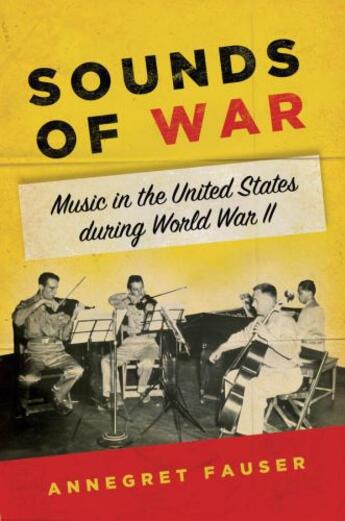Des idées de lecture pour ce début d'année !
Passionné(e) de lecture ? Inscrivez-vous
gratuitement ou connectez-vous pour rejoindre la
communauté et bénéficier de toutes les fonctionnalités du site !

What role did music play in the United States during World War II? How did composers reconcile the demands of their country and their art as America mobilized both militarily and culturally for war?
Annegret Fauser explores these and many other questions in the first in-depth study of American concert music during World War II. While Dinah Shore, Duke Ellington, and the Andrew Sisters entertained civilians at home and G.I.s abroad with swing and boogie-woogie, Fauser shows it was classical music that truly distinguished musical life in the wartime United States. Classical music in 1940s America had a ubiquitous cultural presence--whether as an instrument of propaganda or a means of entertainment, recuperation, and uplift--that is hard to imagine today, and Fauser suggests that no other war enlisted culture in general and music in particular so consciously and unequivocally as World War II. Indeed, the day after the attack on Pearl Harbor, Group Theatre director Harold Clurman wrote to his cousin, Aaron Copland: "So you're back in N.Y. . . ready to defend your country in her hour of need with lectures, books, symphonies!" Copland was in fact involved in propaganda missions of the Office of War Information, as were Marc Blitzstein, Elliott Carter, Henry Cowell, Roy Harris, and Colin McPhee. It is the works of these musical greats--as well as many other American and exiled European composers who put their talents to patriotic purposes--that form the core of Fauser's enlightening account.
Drawing on music history, aesthetics, reception history, and cultural history, Sounds of War recreates the remarkable sonic landscape of the World War II era and offers fresh insight to the role of music during wartime.
Il n'y a pas encore de discussion sur ce livre
Soyez le premier à en lancer une !

Des idées de lecture pour ce début d'année !

Si certaines sont impressionnantes et effrayantes, d'autres sont drôles et rassurantes !

A gagner : la BD jeunesse adaptée du classique de Mary Shelley !

Caraïbes, 1492. "Ce sont ceux qui ont posé le pied sur ces terres qui ont amené la barbarie, la torture, la cruauté, la destruction des lieux, la mort..."